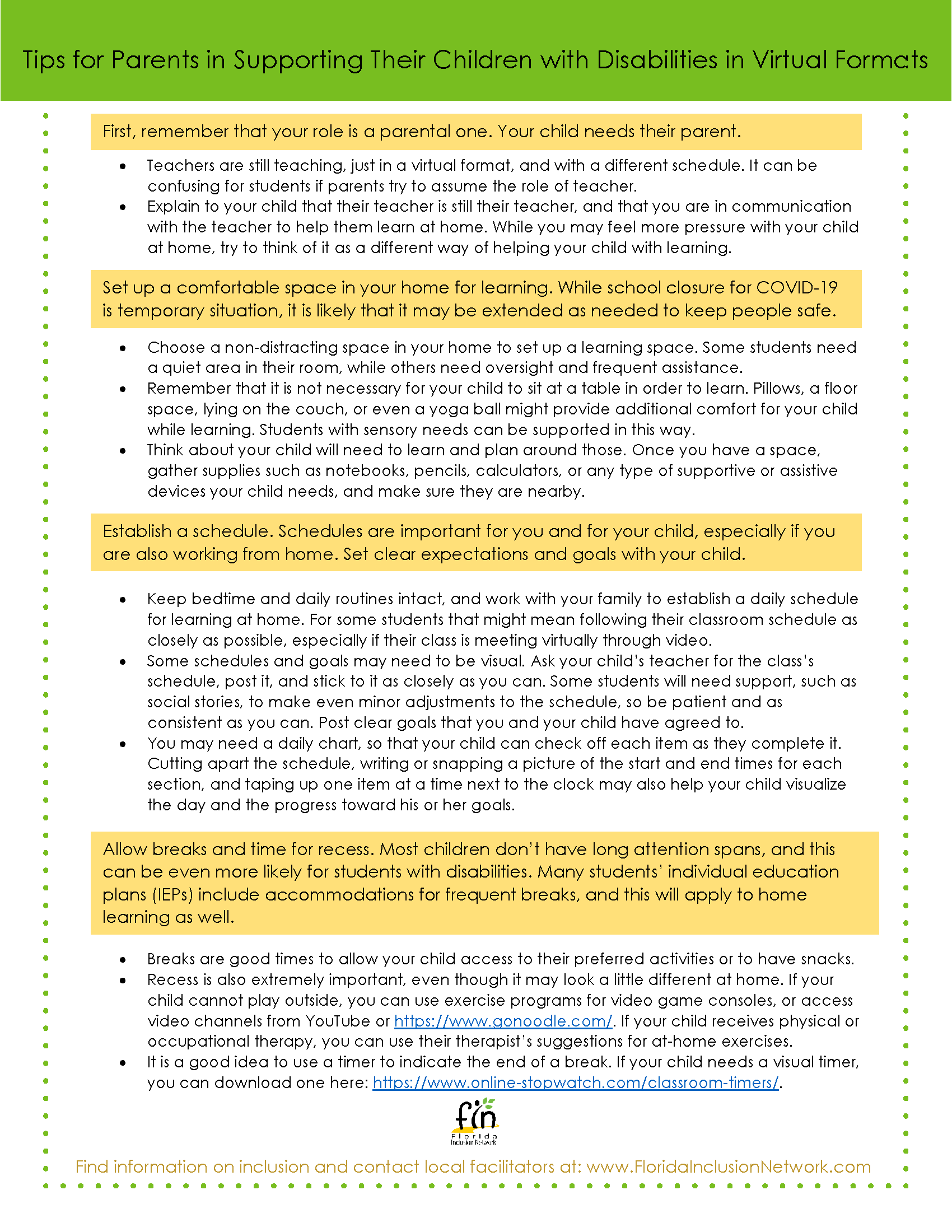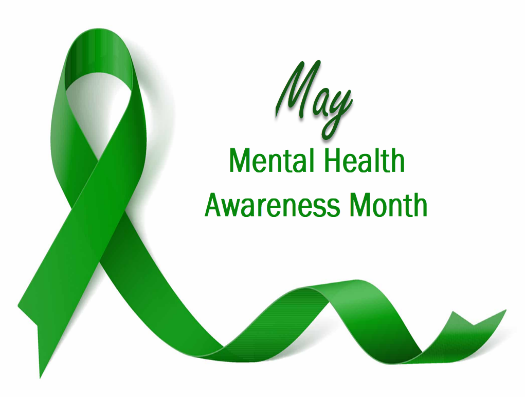Mental Health and Wellness
Positive mental health allows people to:
- Realize their full potential
- Cope with the stresses of life
- Work productively
- Make meaningful contributions to their communities
Ways to maintain positive mental health include:
- Getting professional help if you need it
- Connecting with others
- Staying positive
- Getting physically active
- Helping others
- Getting enough sleep
- Developing coping skills
 https://sss.usf.edu/resources/topic/mentalhealth/index.html
https://sss.usf.edu/resources/topic/mentalhealth/index.html
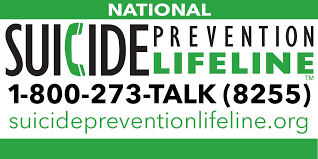
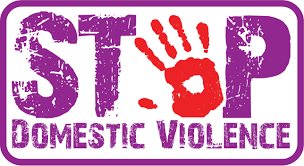
National Suicide Prevention Lifeline National Coalition Against Domestic Violence

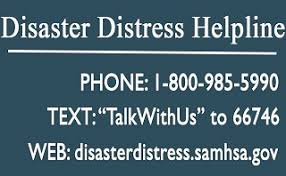
National Domestic Violence Hotline Disaster Distress: Substance Abuse and Mental Health Online
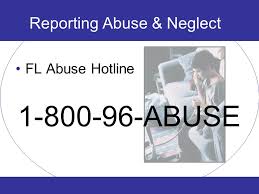
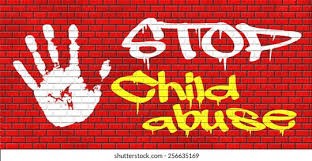
Florida Abuse Hotline Report Abuse Online
Need Help? Know Someone Who Does?
Call the National Suicide Prevention Lifeline at 1-800-273-8255 or chat now.
Call the National Domestic Violence Hotline at 1-800-799-7233 or TTY 1-800-787-3224 or chat now.
Call the Florida Child Abuse Hotline at 1-800-962-2873, Florida Relay 711 or TTY 1-800-955-8771. Or report abuse online.
Contact the Disaster Distress Helpline by calling 1-800-985-5990 or text TalkWithUs to 66746 (TTY 1-800-846-8517)
If you or someone you care about is feeling overwhelmed with emotions like sadness, depression, or anxiety, or feel like you want to harm yourself or others, call 911
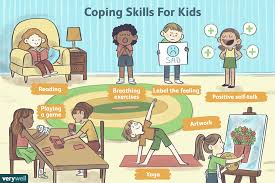
Things you can do to support your child
Take time to talk with your child or teen about the COVID-19 outbreak. Answer questions and share facts about COVID-19 in a way that your child or teen can understand.
Reassure your child or teen that they are safe. Let them know it is ok if they feel upset, confused or even angry about the disruption to their normal life. Share with them how you deal with your own stress so that they can learn how to cope from you.
Limit your family’s exposure to news coverage of the event, including social media. Children may misinterpret what they hear and can be frightened about something they do not understand.
Try to keep up with regular routines. If schools are closed, create a schedule for learning activities and relaxing or fun activities.
Be a role model. Take breaks, get plenty of sleep, exercise, and eat well.
Connect with your friends and family members.
Learn more about helping children cope.

Things you can do to support yourself
Take breaks from watching, reading, or listening to news stories, including social media. Hearing about the pandemic repeatedly can be upsetting.
Take care of your body. Take deep breaths, stretch, or meditate. Try to eat healthy, well-balanced meals, exercise regularly, get plenty of sleep, and avoid alcohol and drugs.
Make time to unwind. Try to do some other activities you enjoy.
Connect with others. Talk with people you trust about your concerns and how you are feeling. Many people are using video chats to feel connected to their friends and loved ones and report that it is helpful to relieve anxiety and stress.
Learn more about taking care of your emotional health.
Call your healthcare provider if stress gets in the way of your daily activities for several days in a row.
WEBINARS
Webinar: COVID-19 Mental Health Tips for Children and Families
https://www.youtube.com/watch?v=iDpUTJBxBWQ
Webinar: Mental Health for Remote Workers - Supporting Employees and One Another
https://www.youtube.com/watch?v=8VYuuYnVRnc

https://www.cdc.gov/coronavirus/2019-ncov/community/mental-health-non-healthcare.html
https://www.cdc.gov/coronavirus/2019-ncov/community/schools-childcare/operation-strategy.html
https://www.cdc.gov/mentalhealth/index.htm
Helpful websites
Florida Department of Education (FDOE) - http://www.fldoe.org/em-response/index.stml
America School Counseling Association (ASCA) - https://www.schoolcounselor.org/school-counselors/professional-development/learn-more/covid-update
National Association of School Psychologists (NASP) - https://www.nasponline.org/resources-and-publications/resources-and-podcasts/covid-19-resource-center
School Social Work Association of America (SSWAA) - https://www.sswaa.org/covid-19-resources
National Association of School Nurses (NASN) - https://www.nasn.org/nasn/nasn-resources/practice-topics/covid19
Mental Health Technology Transfer Center Network (MHTTC) - https://mhttcnetwork.org/centers/global-mhttc/responding-covid-19-mental-health-disparities
Victim Connect Resource Center - https://victimconnect.org/tipos-de-delitos/violencia-domestica/?lang=es
National Teen Dating Abuse Hotline - https://www.loveisrespect.org/
Helpful videos
Coping with Covid-19 through Connections (YouTube videos)
Helpful Apps
This app, which is based on the principles of cognitive-behavioral therapy, was created to help people struggling with depression. It can also help those who are dealing with anxiety, stress, anger, and other issues, as it helps to identify thought patterns that lead to negative feelings and offers up alternate ways of thinking during tough times.
It offers features like relaxing breathing techniques, a journal to keep track of thoughts and moods, guided exercises to help you feel grounded, and other inspirational materials.
Cost: Free, but offers in-app purchases
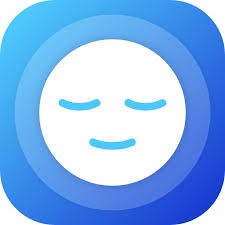
MindShift is a mental health app designed specifically for teens and young adults with anxiety. Rather than trying to avoid anxious feelings, Mind Shift stresses the importance of changing how you think about anxiety. Think of this app as the cheerleader in your pocket, encouraging you to take charge of your life, ride out intense emotions, and face challenging situations. (Free; iOS and Android)

Happify! Need a happy fix? With its psychologist-approved mood-training program, the Happify app is your fast-track to a good mood. Try various engaging games, activity suggestions, gratitude prompts and more to train your brain as if it were a muscle, to overcome negative thoughts. The best part? Its free! (Free; iOS and Android)
SOCIAL AND EMOTIONAL LEARNING

Five Star Life is releasing our Social and Emotional Learning video curriculum to students, parents, and educators to access online for FREE. During this time of uncertainty, students and parents need hope and support. Our video lessons will help students overcome fear and anxiety, as well as, help them adjust to a new routine of completing school work at home. Here are some of the topics covered to help students adapt and adjust:
- Dealing with change
- Coping with stress and anxiety
- Managing conflict
- Strategies for time management
- Goal-setting
- Navigating friendships and social life
Students and parents can subscribe to our Five Star Life YouTube Channel for daily content, including live streams and two SEL video lessons per week.
Don’t forget about the downloadable journal reflection notes to help process the video lesson. Click here to receive notes and COVID-19 curriculum updates.
Follow us on social media (@thefivestarlife) for updates and join us for weekly LIVE STREAMS WITH COACH SETH & COACH MORGAN.
Hit us up on social media or click here to submit questions for Coach Seth and Coach Morgan.
Questions will be answered during the live streams.
Learn more about 5-Star Life Social and Emotional Learning Video Curriculum.
Family Products
